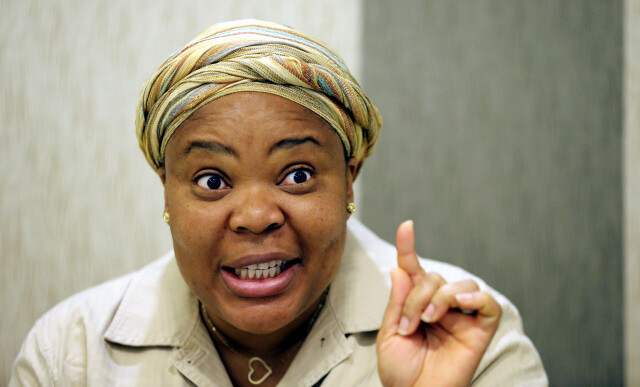hankyoreh
Links to other country sites 다른 나라 사이트 링크
[Interview] Liberian Nobel laureate has something to say to S. Korean gov’t

“I would like to say something to President Park Geun-hye. I want to tell her that weapons will not end the war on the Korean Peninsula. That only genuine dialogue can bring peace.”
Leymah Gbowee, a 2011 Nobel Peace Prize winner from Liberia, made a call on May 25 for the Park administration to engage in dialogue toward reconciliation and cooperation with North Korea. Gbowee, 44, spoke to the Hankyoreh at a Seoul hotel after arriving in South Korea the previous day through the WomenCrossDMZ Peace March, an event by women’s rights activists from around the world who crossed the Demilitarized Zone from North to South to send a message of peace.
“In my home country of Liberia, the civil war was started by two groups, but as more weapons came in they splintered into fifteen groups,” Gbowee explained. “Weapons cannot bring peace.”
“No other country can bring peace to North and South Korea,” she added. “South Korea depends on the US and North Korea depends on China, but neither the US nor China is bringing peace.”
The civil war in Liberia, a coastal country in West Africa, first erupted in 1989. Some 250,000 people would eventually lose their lives in the 14-year conflict. While working as a peace activist with her training in the treatment of wartime trauma, she drew widespread attention for organizing a “sex strike” campaign where women refused to have sex. In June 2003, she led a group of women in an occupation of a hotel where the civil war camps were holding peace talks. Her actions helped lead to the ultimate peace treaty agreement on August 18 of the same year.
In 2005, Gbowee supported the election campaign of Ellen Johnson Sirleaf, 77, and helped her win election as Africa’s first female president. The women were co-recipients of the Nobel Peace Prize in 2011 for “their non-violent struggle for the safety of women and for women’s rights to full participation in peace-building work.”
During the interview, Gbowee responded to conservative groups’ denunciation of WomenCrossDMZ participants as “pro-North Korea.”
“We do not support any regime,” she said.
“While in North Korea, we did not bow before the statues of Kim Il-sung and Kim Jong-il,” she added. “I see that in itself as challenging North Korean people to talk about their veneration. If North Koreans keep interacting with the outside, it will be a very different country in ten years.”
During the 2015 International Women’s Peace Symposium that afternoon at Seoul City Hall, North Korean refugee Lee Ae-ran protested that nobody present was “talking about North Korea’s nuclear weapons development or prisoners in concentration camps.” Gbowee, who was attending as a presenter, came down from the front platform to embrace Lee tightly.
“As a citizen of the world, I sympathize with and apologize for your suffering and the suffering of the North Korean people,” she said. “We are also speaking out to relieve their pain.”
By Kim Ji-hoon, staff reporter
Please direct questions or comments to [english@hani.co.kr]

Editorial・opinion
![[Column] Park Geun-hye déjà vu in Yoon Suk-yeol [Column] Park Geun-hye déjà vu in Yoon Suk-yeol](https://flexible.img.hani.co.kr/flexible/normal/500/300/imgdb/original/2024/0424/651713945113788.jpg) [Column] Park Geun-hye déjà vu in Yoon Suk-yeol
[Column] Park Geun-hye déjà vu in Yoon Suk-yeol![[Editorial] New weight of N. Korea’s nuclear threats makes dialogue all the more urgent [Editorial] New weight of N. Korea’s nuclear threats makes dialogue all the more urgent](https://flexible.img.hani.co.kr/flexible/normal/500/300/imgdb/original/2024/0424/7317139454662664.jpg) [Editorial] New weight of N. Korea’s nuclear threats makes dialogue all the more urgent
[Editorial] New weight of N. Korea’s nuclear threats makes dialogue all the more urgent- [Guest essay] The real reason Korea’s new right wants to dub Rhee a founding father
- [Column] ‘Choson’: Is it time we start referring to N. Korea in its own terms?
- [Editorial] Japan’s rewriting of history with Korea has gone too far
- [Column] The president’s questionable capacity for dialogue
- [Column] Are chaebol firms just pizza pies for families to divvy up as they please?
- [Column] Has Korea, too, crossed the Rubicon on China?
- [Correspondent’s column] In Japan’s alliance with US, echoes of its past alliances with UK
- [Editorial] Does Yoon think the Korean public is wrong?
Most viewed articles
- 1‘We must say no’: Seoul defense chief on Korean, USFK involvement in hypothetical Taiwan crisis
- 2N. Korean delegation’s trip to Iran shows how Pyongyang is leveraging ties with Moscow
- 346% of cases of violence against women in Korea perpetrated by intimate partner, study finds
- 4[Column] Park Geun-hye déjà vu in Yoon Suk-yeol
- 5‘Weddingflation’ breaks the bank for Korean couples-to-be
- 6Will NewJeans end up collateral damage in internal feud at K-pop juggernaut Hybe?
- 7Amnesty notes ‘erosion’ of freedom of expression in Korea in annual human rights report
- 8[Interview] Dear Korean men, It’s OK to admit you’re not always strong
- 9Korean government’s compromise plan for medical reform swiftly rejected by doctors
- 10[Editorial] Japan’s rewriting of history with Korea has gone too far